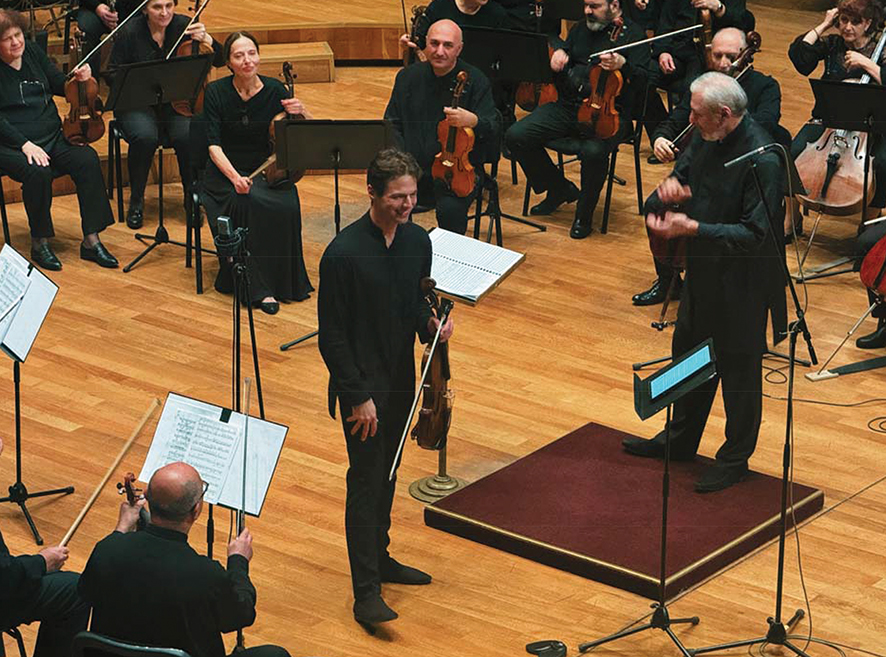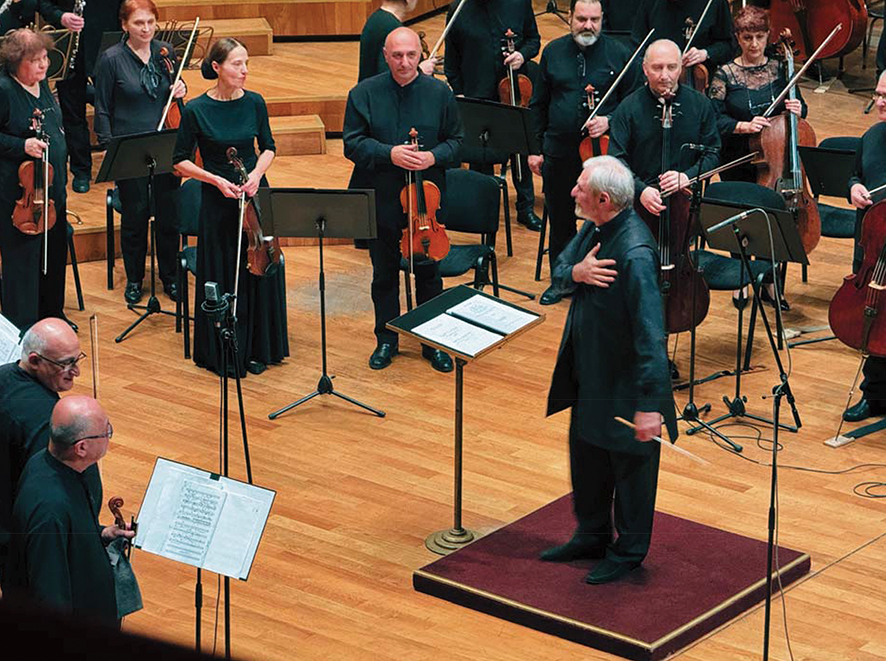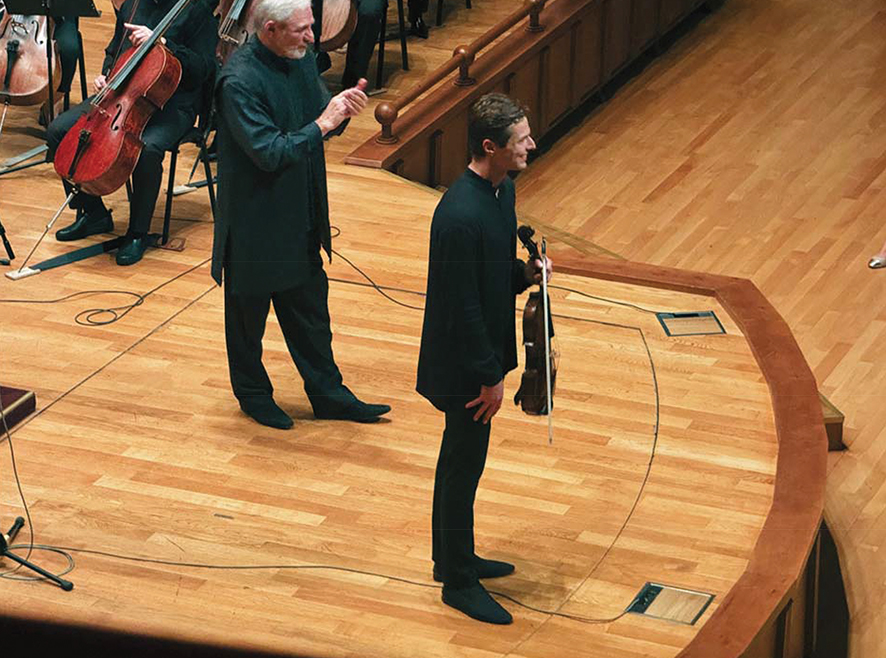On September 28, the Djansug Kakhidze Tbilisi Music and Culture Center hosted an evening that transcended the conventions of a concert. Part of the international festival Autumn Tbilisi, the program honored what would have been the ninetieth birthday of Giya Kancheli — Georgia’s most enigmatic and universally celebrated composer of the late twentieth century. The Tbilisi Symphony Orchestra, the Georgian State Choir, and the remarkable young violist Georgy Kovalev performed under the baton of Vakhtang Kakhidze, whose intimate understanding of Kancheli’s language imbued the evening with filial devotion.
The program was structured in two distinct phases. The first half presented the Largo and the Fifth Symphony, establishing a trajectory from meditative stillness to existential tumult. The second half culminated in Styx for viola, choir, and orchestra — a work that stands as Kancheli’s most intense reflection on mortality and collective memory.
Kancheli’s Aesthetic of Absence
Kancheli was never merely a composer of notes; he composed absences, lacunae charged with metaphysical tension. While Western critics have categorized his style as “post-Soviet minimalism” or “sacred austerity,” Georgians perceive a more intimate dimension: a sound-world attuned to the ruins and rituals of a small nation negotiating survival under the shadow of empires.
The Largo opened the evening with the serenity of a suspended breath. Time itself seemed stretched toward eternity, with orchestral lines dissolving into near-inaudible spaces. Under Vakhtang Kakhidze’s guidance, the orchestra balanced gravity with fragility, allowing every phrase to linger as if it were waiting to be absorbed by memory itself.

The Fifth Symphony: Between Catastrophe and Consolation
The Fifth Symphony followed, unfolding the paradoxical voice of Soviet-era Georgian art: how to articulate dissent and spiritual yearning under ideological constraints. The work alternates between fragile lyricism and sudden, almost violent, orchestral outbursts. These eruptions are not merely structural; they are existential intrusions, historical tremors captured in sound.
Kakhidze’s interpretation emphasized both the collective and the intimate: the orchestra responded with precision, yet each passage conveyed vulnerability, as if the musicians themselves were carrying the weight of national memory. The symphony’s long, introspective lines interspersed with sudden climactic bursts created a musical landscape where grief, hope, and resilience coexist uneasily but inexorably.
Styx: Music as Ritual for the Dead
The concert’s second half culminated in Styx, Kancheli’s profound meditation on mortality, mourning, and the metaphysical threshold between life and death. Georgy Kovalev’s viola assumed a role of both human voice and archetypal witness, navigating a fragile trajectory between the orchestral mass and the choir’s near-monastic whispers.
The Georgian State Choir, entering with disciplined restraint, did not so much sing as articulate collective memory. Each choral utterance felt like an invocation; each pause, an acknowledgment of the void. In a country still resonating with the echoes of war, exile, and cultural survival, Styx functioned as a civic ritual, translating grief into sound.
Kancheli described music as “the silence that listens back,” and in Styx, this principle becomes palpable. Silence is not neutral; it is an active, almost sentient presence. The long gaps between Kovalev’s fragile lines and the choir’s responses felt like temporal fissures, where the listener is invited to confront absence itself.

The Viola as Witness
If Styx demanded a solitary voice capable of embodying both human fragility and archetypal resonance, Georgy Kovalev delivered it with a mastery that was impossible to ignore. His playing transcended technical brilliance; every phrase seemed to inhabit a liminal space between vulnerability and inevitability. Kovalev’s tone was simultaneously raw and refined, capable of expressing intimate lament while articulating the work’s cosmic gravitas.
His interpretation was not merely a performance but a profound act of listening and responding. In passages where the viola traces slow, aching arcs against the orchestral mass, Kovalev maintained perfect equilibrium: every note was suspended in memory, every silence pregnant with implication. When the choir entered, he neither competed nor receded; he inhabited the threshold between the individual and the collective, bridging the human and the mythic.
Kovalev’s work on this evening reaffirmed a simple truth about Kancheli’s music: the instrument is not a vehicle for virtuosity alone but a medium for ethical, existential expression. The audience’s engagement — a silent, almost reverent stillness — testified to the impact of his artistry. Here, the viola became more than an instrument; it became a conscience, a witness, a vessel of remembrance.
In an era when technical perfection can often overshadow interpretive depth, Kovalev reminded listeners that true mastery lies in inhabiting the music, not merely performing it. In Styx, he became both guide and interlocutor, leading the audience into the very spaces where Kancheli’s silence listens back.

The Future of Listening
Why celebrate Kancheli at ninety? His work, haunted by silence and rupture, resonates with contemporary anxieties. In a Georgia negotiating political and existential turbulence, Kancheli’s compositions act as reflective spaces where private grief intersects with collective history.
Globally, Kancheli defies easy categorization. His music is neither Western minimalism nor nationalistic folklore; it inhabits a liminal space between liturgy and avant-garde, between intimate lament and public ritual. This liminality makes his legacy urgent for the twenty-first century, offering a model of listening that is contemplative, patient, and ethically aware.
September 28 was not just a commemoration but a test of our capacity to hear Kancheli’s demands: to dwell in silence, to confront rupture, to wait for consolation that may never arrive.
As Georgy Kovalev’s viola dissolved into stillness at the end of Styx, one realized that Kancheli’s legacy resides not in the notes themselves but in the spaces between them — where history, memory, and transcendence converge. In that silence, Georgia’s past and future listened to one another.
Review by Ivan Nechaev














